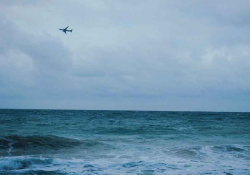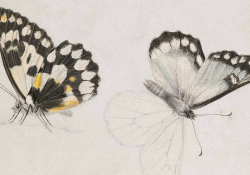Five Poems by Julia Fiedorczuk

Bio
How unlike a dead fish a live fish is
– Maxine Hong Kingston
Kiedy byłam rybą
Kosmos jak zawsze okrągły
Miał przytulne ściany
Śniłam o boskich płetwach
Pióropuszach i życiu
Po wodzie
Mówiono ogon
Odpada ale jest nagroda:
Para bolesnych stóp.
Nie wierzyłam
W bajki. Zapuściłam
Skrzydła jak liście
Czarnych paproci.
Och gdzież ja
Nie byłam!
Kiedy byłam rybą
Nie było w ogóle dni,
Seksu, ani różnicy.
Ciepło przychodziło
Z zewnątrz. Teraz
Mam w płucach nieznośnie
Lekkie powietrze,
Mam pokusę morza
W zielonych tęczówkach.
Patrzę w niebo: wieżyczko
Jakaś ty cudowna. Tańczę
Dla ciebie.
Bio
How unlike a dead fish a live fish is
– Maxine Hong Kingston
When I was a fish
Space had cozy walls
And as always was round
I dreamed of divine fins
Feather headdresses and life
Upon the water
It was said the tail
Drops off but there is a reward:
A pair of aching feet.
I did not believe
In fairy tales. I grew
Wings like the fronds
Of black ferns.
Where did I
Not go!
When I was a fish
There were no days,
No sex, no difference.
Warmth came
From outside. Now
In my lungs I have unbearably
Light air.
I have the lure of the sea
In my green irises.
I look at the sky: o you
miraculous turret. I dance
For you.
Lądy i oceany
Dosłownie ogień jest nam bliski.
Czasami czujesz go w podeszwach stóp.
To znak, że kiedyś wszystko było boskim oceanem.
Zaś głęboki czas ziemi wyraża się w liczbach tak zatrważających,
że ich odkrycie odmieniło bieg ludzkiej myśli.
Która, rzecz jasna, spodziewa się gruntu
pod nogami i przychylnej aury.
Z tej perspektywy słońce jest czymś w rodzaju wieczności,
a morze upartym podtekstem.
Miejsce
ma sens o ile da się wykopać grób.
Tylko gdzieniegdzie można pobudować domy.
Na przekór wszystkiemu wierzy się w trwałość tych śladów,
chociaż powszechnie wiadomo, że lepsza jest jedna garść pokoju.
Jeszcze inne wersje mówią o wysłuchanej modlitwie ryb.
Tak czy inaczej, odmęt ma swoje prawa.
Ciała poniekąd stałe, mamy przecież łzy, a te są w każdym słowie:
bo sól jest na końcu języka i jest kropką nad i.
Lands and oceans
It is precisely fire that is dear to us.
At times you feel it on the soles of your feet.
It’s a sign that everything was once divine ocean,
while the deep time of earth is expressed in such disquieting numbers
that their discovery has changed the course of human thought.
Which, it goes without saying, expects the ground
beneath its feet, and a favorable ambience.
From this perspective the sun is something like eternity,
the sea a stubborn subtext.
The place
will work so long as graves can be dug.
Only in certain locations can houses be built.
Despite everything there’s faith in the permanence of these traces,
though everyone knows it’s better to have one handful of peace.
Still other versions speak of the answered prayer of the fish.
One way or the other, chaos has its laws.
Bodies are solid, though we do have tears, and they are in every word:
for salt is on the tongue’s tip and is the dot over the i.
Ramię Oriona
Wielkie poruszenie na tych gładkich morzach,
kłębią się ciężkie, ciemne ciała ryb.
To duch awaryjnie ląduje na wodzie,
ślizga się, tnie toń, wytraca prędkość, czas.
Czas rozdzielić poły słonecznego płaszcza,
uwolnić wiatr -
i już.
Pył międzygwiazdowy na listkach pierwszych drzew.
Rozmodlony zając strząsa słoną rosę,
lgnie do ciepłej ziemi wsłuchany w jej musujące tętno.
Asymilacja i dysymilacja. CO2, H2O,
i światło, światło, światło,
przemiana materii w materię, wzrost i dojrzewanie
w płaskim dysku falującej Galaktyki.
Czarna śmierć pulsuje cicho pomiędzy gwiazdami,
"Koło biegunu krąży wiecznymi obwody" -
płomienna Betelgeuse, Rigel, Bellatrix -
jadą Kosiarze na jesienne niebo, patrz!
Patrzymy. Masz we włosach mgłę i nitki pajęczyny,
niesiesz reklamówkę pełną zimnych gruszek.
Orion’s Shoulder
Great turbulence on these smooth seas,
dark heavy bodies of the fish are swirling:
the spirit is making an emergency landing,
cutting across the water, losing speed, losing time.
Time now to separate the tails of the solar coat,
to free the wind –
it’s done.
Interstellar dust on the young leaves of first trees.
A hare, rapt in prayer, brushes the salty dew
and presses to the warm earth, intent on its frothing pulse.
Assimilation and dissimilation. CO2, H2O,
and light, light, light,
metabolic conversion, growth and maturation
within the flat disk of the rippling Galaxy.
Dark death is throbbing softly among the stars,
“revolving round the axle of the heavens” –
fiery Betelgeuse, Rigel, Bellatrix –
the Reapers are riding through the autumn sky
– just look!
We look. You’ve mist and strands of cobweb in your hair,
you’re carrying a bagful of cold pears.
Szuflada
Niektórzy kolekcjonują opiłki przeszłości.
Są bezcenne jak szadź na przydrożnych brzozach.
Zwłaszcza liczą się nieliczne momenty bezwzględnej przytomności umysłu,
ekwinokcjum.
Jej pamiątki: stos kolorowych pism, w których jest całe piękno świata.
Ścinki tkanin, z których uszyto suknie na każdą okazję.
Kolorowe włóczki. Poduszka. Pod tym wszystkim
ktoś kiedyś odkryje mapę nieaktualnego świata.
Pejzaż przestarzałych państw.
Stada nieżyjących zwierząt, pożywiające się dawno wymarłym gatunkiem trawy.
Domy zjedzone przez wodę i przez wiatr, a w domach
pożółkłe zdjęcia mieszkańców.
Drawer
Some collect shavings of the past.
They’re as precious as hoarfrost on roadside birches –
especially treasured at the rare moments of absolute presence of mind,
of equinox.
Its keepsakes: piles of illustrated magazines containing all the beauty in the world.
Scraps from fabric that was used to make gowns for every occasion.
Colored yarns. A cushion. Beneath all this
someone will one day discover a map of an obsolete world –
a landscape of defunct countries.
Herds of long-dead animals feeding on an extinct species of grass.
Houses eroded by water and by wind, and in the houses
faded photographs of those who once lived there.
Relentlessly craving
B. G.
wierszu wierszu bądź mocny
jak fala uderzeniowa, koncert A-moll Griega
zapuść korzenie, znajdź źródło, kwitnij, wydaj owoc
ożyj, wierszu, chcę twojej krwi
wierszu, wierszu bądź tak niebezpiecznie piękny
jak pijana kobieta na obrazie Muncha
liczą się tylko podstawowe barwy, żółty, czarny, czerwony
liczy się ogień
jest czas nadziei
i czas rozpaczy
liczy się ogień
jeśli nie masz ciała
nie znasz miłości
ani nie znasz śmierci
wierszu, wierszu bądź w słońcu
w oku świata
w przemianie chleba w ruch
w ustawicznym rozpadzie, który jest warunkiem wszelkiej syntezy
we krwi
ogniu
bądź
jest czas nadziei
i czas rozpaczy
liczy się ogień i lód
wierszu wierszu bądź jak ciemna noc duszy
Relentlessly Craving
for B. G.
poem, poem be strong
like a shock wave, Grieg’s Concerto in A Minor
put down roots, find the source, bloom, bear fruit
come to life, poem, I need your blood
poem, poem be as perilously lovely
as the drunken woman in the painting by Munch
what counts are only the base colors, yellow, black, red
what counts is fire
there is a time for hope
and a time for despair
what counts is fire
if you have no flesh
you do not know love
nor do you know death
poem, poem be in the sun
in the eye of the world
in the turning of bread into motion
in the constant decay that is the condition of all synthesis
in the blood
fire, be
there is a time for hope
and a time for despair
what counts is fire and ice
poem, poem be like the dark night of the soul
Translations from the Polish
By Bill Johnston














